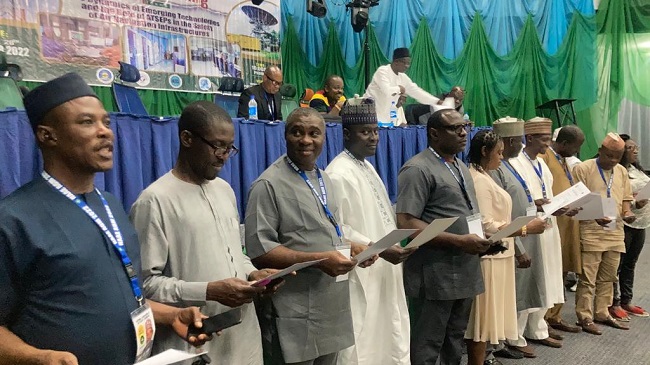[ad_1]
The National Association of Air Traffic Engineers (NAAE) has elected Mr Selzing Miri as its new president.
In his acceptance speech, Miri solicited the support of all the contestants in running the association for the overall development of the association even as described
task ahead as enormous especially the unity of members as some have lost apathy due to what they have passed through.
According to Miri, training will be the focal point of his administration to ensure that members were up to date with their job
He equally promised that his team will engage the Nigerian Airspace Management Agency (NAMA) management to see the need to provide very efficient operational vehicles to all stations as their job has to do with safety and security.
Miri said the greatest challenge remained the non-availability of major tools to work with but emphasised that he will synergize with other professional bodies in NAMA to achieve the best for the agency.
Meanwhile, the following executive members were elected to run the affairs of the association for two years.
Among the other executives elected included: Deputy President, Akanbi Wasiu, Zonal Vice President (KANO), Ibrahim Auyo, Zonal Vice President (ABUJA), Udokwu Davies, Zonal Vice President (Port Harcourt),Abba Ephraim, Zonal Vice President (LAGOS), Adeagbo Christiana and Muhammadu shu’aibu General Secretary.
Speaking after his handover to the new president, the immediate past president of NAAE, Mr Ishaya Dung described his tenure as eventful, challenging but successful.
Dung, while noting that his challenges among which included the cancellation of the 2021 NAAE AGM/Elections due to internal wrangling, also identified agitations for improved welfare for members and provision of adequate working tools/equipment as one of the challenges faced.
The former NAAE boss congratulated the new executives and advised them to have a listening ear, to employ scientific reasoning and strategic thinking and as well consult widely and apply wisdom and diplomacy in addressing issues that affect members and the ATSEP profession at large.
[ad_2]








